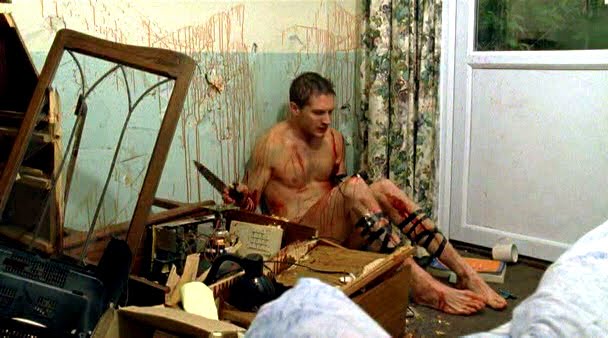Ah, the biopic, one of the most dependably square film/TV genres in existence. All the messiness of life, all its unpredictability and rough edges, are frequently filled away in favor of showy performances and some sort of message (life is precious, drugs are bad, mental illness sucks, society just doesn’t understand you, etc). This is all well and good, but it makes so many these films colorless affairs. Occasionally, there are biopics that transcend their trappings based on the sheer virtuoso of their actors (Frances, La Vie En Rose). More often than not, you can count the mechanical beats and see the pinwheels in the actors’ eyes, all vying for as many awards they can fit on their mantles. Stuart: A Life Backwards, on its surface, seems like such a film. A kindly writer who befriends a mentally ill homeless man? No, wait: a kindly writer who befriends a mentally homeless man who is already dead at the beginning of the film, so we, the audience, can see via flashback how that poor soul was too pure for this world? Sounds suspiciously like that one film starring Jamie Foxx and Robert Downey Jr. that nobody remembers.
Stuart: A Life Backwards, a single drama biopic from HBO and BBC, is thankfully not one of those films. It’s closer in spirit to Star 80 and Gia; a quasi-documentary where the story is played straight in some segments, while other scenes are conducted like interviews, allowing the supporting characters to muse about their relationships with the central figure. The story of Stuart Shorter (Tom Hardy), as told through his friend, writer Alexander Masters (Benedict Cumberbatch), is a perfect fit for this biopic format.
The film is not an easy one to detail, simply because so much of its power comes it’s carefully constructed narrative, and the individual interactions between Hardy and Cumberbatch. To reveal what makes the film so powerful using individual scenes ruins the tragic suspense of the story. In the barest plot sketch, the film concerns Masters, a writer and volunteer at a homeless shelter, who befriends Stuart, a mentally ill, alcoholic, drug-addicted homeless man. Within his damaged psyche, he has a droll sense of humor, and Masters wants to write his biography. Stuart agrees, on one condition: his story must be told backwards, from when he met Masters to his early childhood.
As an actors’ showcase, the drama is glorious. Cumberbatch plays Masters not as a savior nor a cynic looking for an opportunity to exploit. He plays Masters with straightforward simplicity; the film doesn’t give Masters any explicit ulterior motives, so his curiosity regarding Stuart appears genuine. Hardy has the showier of the two roles (he was BAFTA nominated for his work), and he delivers with aplomb. It is worth noting that Hardy himself is a recovering drug addict, and watching this drama, it’s hard to shake the thought he is exorcising some of his own demons. His Stuart wildly veers between almost daffy humor to bone-chilling rage and menace with such fluidity, it never feels like a performance. Hardy does a wonderful job, and beneath all of the humor and rage, he finds Stuart’s heart of sadness. Every scene he’s in is tinged with the melancholy of what could have been.
Another similarly impressive feat of Stuart: A Life Backwards is how it balances comedy and horror. As the film progresses, and the viewer discovers more about Stuart’s past, the film moves into some truly dark, horrific material concerning domestic and child abuse. The first time I saw the film, I found the earlier, lighter portions of the story almost detrimentally at odds with darker scenes. Upon a second viewing, I found them to be in sync with Stuart’s own personality: he had his funny side, but beneath it lay tremendous horrors. The film leaves it ambiguous as to whether Stuart was always funny, or if his humor was a barrier between the rage and misery he felt.
Like it’s central subject, Stuart: A Life Backwards doesn’t provide any concrete answers. However, that works to be its greatest strength. It never turns Stuart Shorter’s life into a cheap morality play; it invites us to watch the story of a Stuart’s life, sans commentary. The film argues, that’s exactly the way he would have wanted it.

